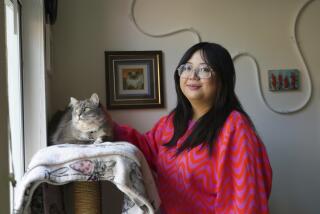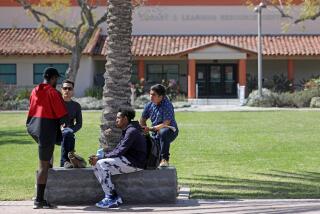Tuition Hikes Blasted at S. Africa Universities
- Share via
BELLVILLE, South Africa — Goodenough Kodwa and his fellow students at the University of the Western Cape on the outskirts of Cape Town got a late start at college this year.
About half of the 14,000 students here have fallen behind in tuition payments, leaving the university $10 million in the hole. So when students arrived this month for the new academic year, they found empty classrooms and locked residential halls. University officials had more than 300 students arrested for trespassing when they refused to leave the campus.
“Certainly I owe money,” said Kodwa, a social science major who is president of the student body. “But to say you are late in paying means you are able to pay. A lot of people here aren’t late--they just can’t pay.”
Western Cape reopened after a deal was struck last week that gives students until the end of the month to come up with a debt repayment plan and pay this year’s fees of $900. Those who miss the deadline will be shown the door.
It is an uncharacteristically harsh stance for a state-run university that has historically welcomed South Africa’s neediest students, but Western Cape’s rector, Cecil Abrahams, says the free ride is over. Students must pay up, he says, or the country’s poorest universities will not survive.
The same hard line is being heard nationwide. On Friday, officials at the University of Fort Hare, the alma mater of President Nelson Mandela, began evicting thousands of students under an urgent court order.
At the end of last year, students owed South Africa’s 21 public universities more than $100 million in overdue fees, with about 80% due to institutions that enroll mostly poor blacks and people of mixed race.
The 10 so-called historically disadvantaged universities that were established under apartheid remain the only avenue to a university degree for thousands of impoverished students who do not meet more stringent academic and financial requirements of traditionally white-oriented universities. And unlike their white counterparts, the black universities have little or no endowments to tide them over during hard times.
“These institutions have felt they have a historical mission to accept those students,” said Tembile Kulati, the former director of the Forum for Historically Disadvantaged Universities. “But it is a double-edged sword, because those students don’t usually have the resources to pay and most of the universities don’t have the mechanisms to collect the money after the students graduate.”
*
In a country long ruled by a white-minority regime that imposed lower standards of education on blacks, the 4-year-old African National Congress government has been overwhelmed by the financial demands of rectifying the past.
About 21% of the national budget goes to education, but the ruling ANC has opted to pump most of that money into primary and secondary schools.
That has left many university students resentful. The end of apartheid, they say, was supposed to bring equal opportunity and better education, not locked lecture halls and higher fees.
“We have had a contest with students who believe Freedom Day meant higher education would be free,” Education Minister Sibusiso Bengu said. “Based on the resources we have . . . higher education will not be free in this country.”
To families squeezed into one-room tin shacks with no plumbing or electricity, a university education still holds the promise of untold prosperity.
“I come from a traditional society where a university degree commands the highest respect,” Kodwa said. “If government wants to change that, they need to engage in a debate and let people see for themselves.”
More to Read
Sign up for Essential California
The most important California stories and recommendations in your inbox every morning.
You may occasionally receive promotional content from the Los Angeles Times.












